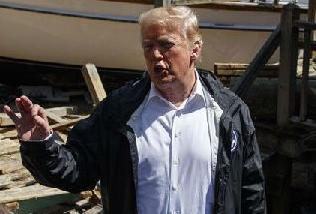英语访谈节目:特朗普前往飓风灾区视察
Today's other major story is the ongoing flood disaster in the Carolinas. Today, the president flew in for a firsthand look at the mess and misery left by Hurricane Florence. William Brangham has our report.
WILLIAM BRANGHAM: President Trump came to flood-ravaged North and South Carolina today to assess the response to Hurricane Florence. His first stop was a Marine Corps station along the North Carolina coast. In a briefing with state and federal officials, the president promised full federal support.
DONALD TRUMP, President of the United States: Unfortunately, the money will be a lot, but it's gonna come as fast as you need it to take care of everybody. To the families who have lost loved ones, America grieves with you and our hearts break for you. God bless you. We will never forget your loss. We will never leave your side. We're with you all the way.

WILLIAM BRANGHAM: He then toured a devastated neighborhood in the city of New Bern and also helped distribute food to local residents. Less than a week since Florence made landfall, a huge part of North Carolina remains deluged. Close to 200,000 residents are still without power, and about 7,800 are living in shelters. Officials are warning that the flooding may worsen still, as rivers throughout the region are bursting their banks. The Cape Fear River, the largest in the state, crested this morning at over 60 feet. That's four times its normal height. The town of Wilmington still remains largely isolated, with no safe routes in or out. Residents stuck in the city have lined up to receive food, water and other supplies. Assessments of the storm's economic and environmental impact are under way. Preliminary estimates say the storm did 22 billion dollars in damage across the region, which would put Florence among the top 10 costliest storms in U.S. history. Floodwaters have killed almost three-and-a-half million chickens and over 5,000 hostages. And waste from those hog farms has been leaking into floodwaters. As the extent of the damage comes into focus, so too are the lessons for the next storm. Brigadier General Diana Holland is with the U.S. Army Corps of Engineers. She says relief efforts will be enhanced the more people prepare for these events ahead of time.
BRIG. GEN. DIANA HOLLAND, U.S. Army Corps of Engineers: The more self-sufficient individuals are and communities are, the better. The more we do that at the individual and local level, the better.
WILLIAM BRANGHAM: During his final stop in South Carolina today, the president reiterated his support for storm survivors.
DONALD TRUMP: Washington is with you. Trump is with you. We are all with you 100 percent. And we will get through it.
WILLIAM BRANGHAM: For the PBS NewsHour, I'm William Brangham.




 手机网站
手机网站